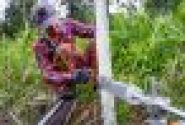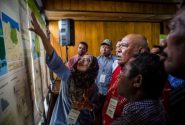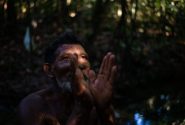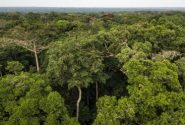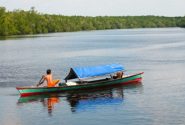
It is hoped that the trial with be a blueprint for safeguards across Indonesia. Photo by Jasper Wiet/Flickr
BOGOR, Indonesia (14 September 2012)_ The Indonesian government plans to conduct a trial of a new system that will provide information on how to implement social safeguards in REDD+ projects in East Kalimantan in December 2012.
The SIS REDD+ system is part of Indonesia’s preparations to ensure that the forest protection compensation scheme follows international standards and is well accepted by the general public.
“We’re conducting this trial to get a template [for the] Indonesian context,” said Nur Masripatin, Head of the Ministry of Forestry’s Center for Standardisation and Environment, at an event to update stakeholders on the system’s development.
The system will help identify the right approaches to meet safeguard criteria set by the UNFCCC Conference of the Parties in 2010, including information transparency and the need to include indigenous and local communities in REDD+ planning, she added.
Safeguards are an essential requirement for the implementation of Reducing Emissions from Deforestation and forest Degradation (REDD+), a global scheme that seeks to compensate developing countries for protecting their forests. More than 40 REDD+ pilot projects have started in Indonesia – many have different safeguards standards, yet all have the same objective – to recognise and support community rights.
Previous CIFOR research has shown that for REDD+ to be fair and effective, it must recognise community rights and allow them to participate in REDD+ decision-making and implementation.
According to the Ministry of Forestry, SIS REDD+ will provide information on how environmental and social protection is ‘addressed and respected’ as developers prepare and implement REDD+ programmes. This system will collect, process, and present data on safeguard practices being used on the ground.
Several organisations have already tried to implement safeguards in REDD+ projects. For example, the Clinton Climate Initiative (CCI), an international NGO, is helping to facilitate safeguard practices in REDD+ pilot projects in Central Kalimantan, such as with PT Rimba Makmur Utama and PT Rimba Makmur.
The CCI has formed a working group to collect suggestions and comments from the public about the influence and impacts of the REDD+ programme in Kalimantan, said Stepi Hakim, CCI’s national coordinator.
“We have also set up a space for complaints in every meeting to accommodate and try to seek solutions toward the communities’ difficulties,” Stepi added.
Safeguard guidelines for all
The issue of safeguards is not new in Indonesia. Different types of safeguards have been applied to different initiatives, such as in forest certification. However, a lack of specific guidelines for all REDD+ projects is confusing REDD+ investors.
There are various types of social safeguards used at the international level, for example the Climate, Community and Biodiversity (CCB) safeguards and the Strategic Environmental and Social Safeguard Assessment (SESA). CCB is a standard for safeguards that allows local communities to measure the carbon themselves, giving them greater control and participation in REDD+ projects in their area.
CCB is usually used by REDD+ developers that intend to sell forest carbon credits in the carbon market, said Dharsono Hartono, Director of PT Rimba Makmur, which manages the Katingan Peat Restoration Project in Central Kalimantan.
In comparison, the World Bank requires REDD+ pilot projects, funded by the public under the Forest Carbon Partnership Facility, to use SESA safeguards.
Hartono urged national and international policy makers to recognise the different social safeguards currently used by REDD+ actors and investors to ensure compatibility. This would make it easier to invest and participate in REDD+ projects, he said.
An example of this mutual recognition occurred in an agreement between the internaitonal Forest Stewardship Council (FSC) and the Indonesian Ecolabeling Institute (LEI), said Agus Sari, Chairperson of the Working Group on Funding Instruments at the REDD+ Task Force. These certification schemes are also both recognised by national and international markets.
As the SIS REDD+ system is rolled out in the coming months, the government will conduct feedback sessions with national, provincial and district level stakeholders to measure the systems success and to ensure improvement.
Edited by: Leony Aurora and Catriona Moss
We want you to share Forests News content, which is licensed under Creative Commons Attribution-NonCommercial-ShareAlike 4.0 International (CC BY-NC-SA 4.0). This means you are free to redistribute our material for non-commercial purposes. All we ask is that you give Forests News appropriate credit and link to the original Forests News content, indicate if changes were made, and distribute your contributions under the same Creative Commons license. You must notify Forests News if you repost, reprint or reuse our materials by contacting forestsnews@cifor-icraf.org.


